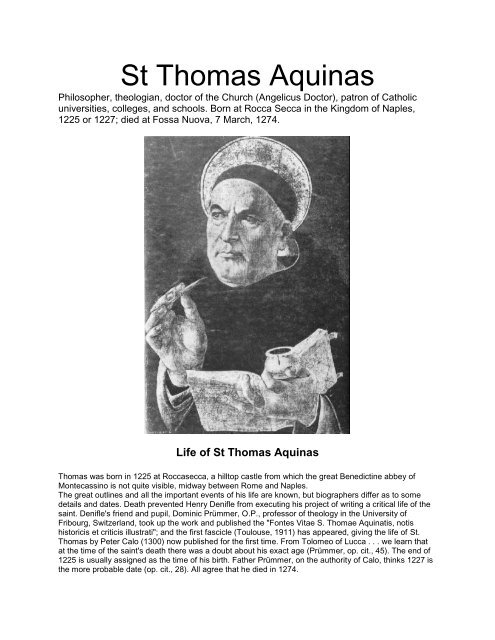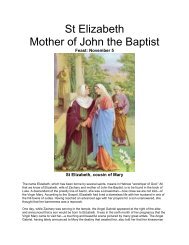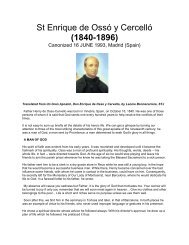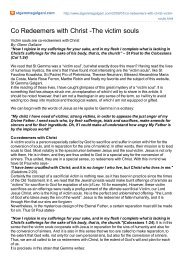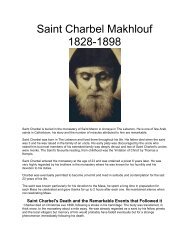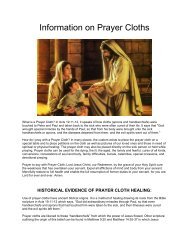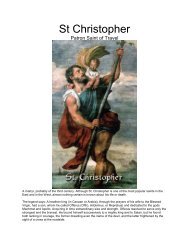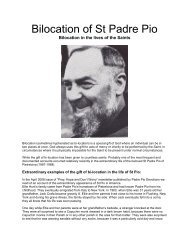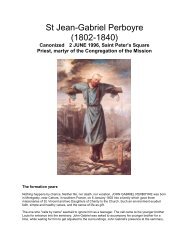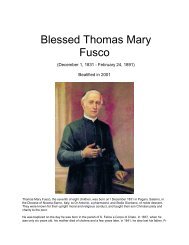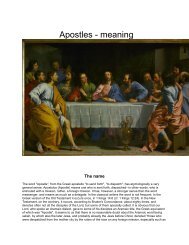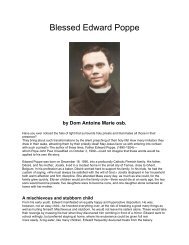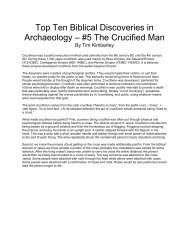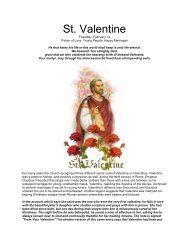St Thomas Aquinas - The Mystical Side of God
St Thomas Aquinas - The Mystical Side of God
St Thomas Aquinas - The Mystical Side of God
You also want an ePaper? Increase the reach of your titles
YUMPU automatically turns print PDFs into web optimized ePapers that Google loves.
Boethius. If from these authors any were to be selected for special mention, undoubtedly they would beAristotle, <strong>St</strong>. Augustine, and Peter Lombard. In another sense the writings <strong>of</strong> <strong>St</strong>. <strong>Thomas</strong> were influencedby Averroes, the chief opponent whom he had to combat in order to defend and make known the trueAristotle.(4) It must be borne in mind that <strong>St</strong>. <strong>Thomas</strong> was blessed with a retentive memory and great powers <strong>of</strong>penetration. Father Daniel d'Agusta once pressed him to say what he considered the greatest grace hehad ever received, sanctifying grace <strong>of</strong> course excepted. "I think that <strong>of</strong> having understood whatever Ihave read", was the reply. <strong>St</strong>. Antoninus declared that "he remembered everything be had read, so thathis mind was like a huge library" (cf. Drane, op. cit., p. 427; Vaughan, op. cit., II, p. 567). <strong>The</strong> bareenumeration <strong>of</strong> the texts <strong>of</strong> Scripture cited in the "Summa theologica" fills eighty small-print columns in theMigne edition, and by many it is not unreasonably supposed that he learned the Sacred Books by heartwhile he was imprisoned in the Castle <strong>of</strong> San Giovanni. Like <strong>St</strong>. Dominic he had a special love for theEpistles <strong>of</strong> <strong>St</strong>. Paul, on which he wrote commentaries (recent edition in 2 vols., Turin, 1891).(5) Deep reverence for the Faith, as made known by tradition, characterizes all his writings. <strong>The</strong>consuetudo ecclesiae — the practice <strong>of</strong> the Church — should prevail over the authority <strong>of</strong> any doctor(Summa II-II:10:12). In the "Summa" he quotes from 19 councils, 41 popes, and 52 Fathers <strong>of</strong> theChurch. A slight acquaintance with his writings will show that among the Fathers his favourite was <strong>St</strong>.Augustine (on the Greek Fathers see Vaughan, op. cit., II, cc. iii sqq.).(6) With <strong>St</strong>. Augustine (On Christian Doctrine II.40), <strong>St</strong>. <strong>Thomas</strong> held that whatever there was <strong>of</strong> truth inthe writings <strong>of</strong> pagan philosophers should be taken from them, as from "unjust possessors", and adaptedto the teaching <strong>of</strong> the true religion (Summa I:84:5). In the "Summa" alone he quotes from the writings <strong>of</strong>46 philosophers and poets, his favourite authors being Aristotle, Plato, and, among Christian writers,Boethius. From Aristotle he learned that love <strong>of</strong> order and accuracy <strong>of</strong> expression which are characteristic<strong>of</strong> his own works. From Boethius he learned that Aristotle's works could be used without detriment toChristianity. He did not follow Boethius in his vain attempt to reconcile Plato and Aristotle. In general the<strong>St</strong>agirite was his master, but the elevation and grandeur <strong>of</strong> <strong>St</strong>. <strong>Thomas</strong>'s conceptions and the majesticdignity <strong>of</strong> his methods <strong>of</strong> treatment speak strongly <strong>of</strong> the sublime Plato.Supernatural causesEven if we do not accept as literally true the declaration <strong>of</strong> John XXII, that <strong>St</strong>. <strong>Thomas</strong> wrought as manymiracles as there are articles in the "Summa", we must, nevertheless, go beyond causes merely natural inattempting to explain his extraordinary career and wonderful writings.(1) Purity <strong>of</strong> mind and body contributes in no small degree to clearness <strong>of</strong> vision (see <strong>St</strong>. <strong>Thomas</strong>,"Commentaries on I Cor., c. vii", Lesson v). By the gift <strong>of</strong> purity, miraculously granted at the time <strong>of</strong> themystic girdling, <strong>God</strong> made <strong>Thomas</strong>'s life angelic; the perspicacity and depth <strong>of</strong> his intellect, Divine graceaiding, made him the "Angelic Doctor".(2) <strong>The</strong> spirit <strong>of</strong> prayer, his great piety and devotion, drew down blessings on his studies. Explaining whyhe read, every day, portions <strong>of</strong> the "Conferences" <strong>of</strong> Cassian, he said: "In such reading I find devotion,whence I readily ascend to contemplation" (Prümmer, op. cit., p. 32). In the lessons <strong>of</strong> the Breviary readon his feast day it is explicitly stated that he never began to study without first invoking the assistance <strong>of</strong><strong>God</strong> in prayer; and when he wrestled with obscure passages <strong>of</strong> the Scriptures, to prayer he addedfasting.(3) Facts narrated by persons who either knew <strong>St</strong>. <strong>Thomas</strong> in life or wrote at about the time <strong>of</strong> hiscanonization prove that he received assistance from heaven. To Father Reginald he declared that he hadlearned more in prayer and contemplation than he had acquired from men or books (Prümmer, op. cit., p.36). <strong>The</strong>se same authors tell <strong>of</strong> mysterious visitors who came to encourage and enlighten him. <strong>The</strong>Blessed Virgin appeared, to assure him that his life and his writings were acceptable to <strong>God</strong>, and that hewould persevere in his holy vocation. <strong>St</strong>s. Peter and Paul came to aid him in interpreting an obscurepassage in Isaias. When humility caused him to consider himself unworthy <strong>of</strong> the doctorate, a venerablereligious <strong>of</strong> his order (supposed to be <strong>St</strong>. Dominic) appeared to encourage him and suggested the text for
his opening discourse (Prümmer, op. cit., 29, 37; Tocco in "Acta SS.", VII Mar.; Vaughan, op. cit., II, 91).His ecstasies have been mentioned. His abstractions in presence <strong>of</strong> King Louis IX (<strong>St</strong>. Louis) and <strong>of</strong>distinguished visitors are related by all biographers. Hence, even if allowance be made for greatenthusiasm on the part <strong>of</strong> his admirers, we must conclude that his extraordinary learning cannot beattributed to merely natural causes. Of him it may truly be said that he laboured as if all depended on hisown efforts and prayed as if all depended on <strong>God</strong>.Influence <strong>of</strong> <strong>St</strong>. <strong>Thomas</strong> (on sanctity)<strong>The</strong> great Scholastics were holy as well as learned men. Alexander <strong>of</strong> Hales, <strong>St</strong>. Albertus Magnus, <strong>St</strong>.<strong>Thomas</strong>, and <strong>St</strong>. Bonaventure prove that learning does not necessarily dry up devotion. <strong>The</strong> angelic<strong>Thomas</strong> and the seraphic Bonaventure represent the highest types <strong>of</strong> Christian scholarship, combiningeminent learning with heroic sanctity. Cardinal Bessarion called <strong>St</strong>. <strong>Thomas</strong> "the most saintly <strong>of</strong> learnedmen and the most learned <strong>of</strong> saints". His works breathe the spirit <strong>of</strong> <strong>God</strong>, a tender and enlightened piety,built on a solid foundation, viz. the knowledge <strong>of</strong> <strong>God</strong>, <strong>of</strong> Christ, <strong>of</strong> man. <strong>The</strong> "Summa theologica" may bemade a manual <strong>of</strong> piety as well as a text-book for the study <strong>of</strong> theology (Cf. Drane, op. cit., p. 446). <strong>St</strong>.Francis de Sales, <strong>St</strong>. Philip Neri, <strong>St</strong>. Charles Borromeo, <strong>St</strong>. Vincent Ferrer, <strong>St</strong>. Pius V, <strong>St</strong>. Antoninusconstantly studied <strong>St</strong>. <strong>Thomas</strong>. Nothing could be more inspiring than his treatises on Christ, in His sacredPerson, in His life and sufferings. His treatise on the sacraments, especially on penance and theEucharist, would melt even hardened hearts. He takes pains to explain the various ceremonies <strong>of</strong> theMass ("De ritu Eucharistiae" in Summa III:83), and no writer has explained more clearly than <strong>St</strong>. <strong>Thomas</strong>the effects produced in the souls <strong>of</strong> men by this heavenly Bread (Summa III:79). <strong>The</strong> principles recentlyurged, in regard to frequent Communion, by Pius X ("Sacra Trid. Synodus", 1905) are found in <strong>St</strong>.<strong>Thomas</strong> (Summa III:79:8, III:80:10), although he is not so explicit on this point as he is on the Communion<strong>of</strong> children. In the Decree "Quam Singulari" (1910) the pope cites <strong>St</strong>. <strong>Thomas</strong>, who teaches that, whenchildren begin to have some use <strong>of</strong> reason, so that they can conceive some devotion to the BlessedSacrament, they may be allowed to communicate (Summa III:80:9). <strong>The</strong> spiritual and devotional aspects<strong>of</strong> <strong>St</strong>. <strong>Thomas</strong>'s theology have been pointed out by Father Contenson, O.P., in his "<strong>The</strong>ologia mentis etcordis". <strong>The</strong>y are more fully explained by Father Vallgornera, O.P., in his "<strong>The</strong>ologia Mystica D. Thomae",wherein the author leads the soul to <strong>God</strong> through the purgative, illuminative, and unitive ways. <strong>The</strong>Encyclical Letter <strong>of</strong> Leo XIII on the Holy Spirit is drawn largely from <strong>St</strong>. <strong>Thomas</strong>, and those who havestudied the "Prima Secundae" and the "Secunda Secundae" know how admirably the saint explains thegifts and fruits <strong>of</strong> the Holy Ghost, as well as the Beatitudes, and their relations to the different virtuesNearly all good spiritual writers seek in <strong>St</strong>. <strong>Thomas</strong> definitions <strong>of</strong> the virtues which they recommend.Influence <strong>of</strong> <strong>St</strong>. <strong>Thomas</strong> (on intellectual life)Since the days <strong>of</strong> Aristotle, probably no one man has exercised such a powerful influence on the thinkingworld as did <strong>St</strong>. <strong>Thomas</strong>. His authority was very great during his lifetime. <strong>The</strong> popes, the universities, thestudia <strong>of</strong> his order were anxious to pr<strong>of</strong>it by his learning and prudence. Several <strong>of</strong> his important workswere written at the request <strong>of</strong> others, and his opinion was sought by all classes. On several occasions thedoctors <strong>of</strong> Paris referred their disputes to him and gratefully abided by his decision (Vaughan, op. cit., II, 1p. 544). His principles, made known by his writings, have continued to influence men even to this day.This subject cannot be considered in all its aspects, nor is that necessary. His influence on matters purelyphilosophical is fully explained in histories <strong>of</strong> philosophy. (<strong>The</strong>ologians who followed <strong>St</strong>. <strong>Thomas</strong> will bementioned in THOMISM. See also ORDER OF PREACHERS) His paramount importance and influencemay be explained by considering him as the Christian Aristotle, combining in his person the best that theworld has known in philosophy and theology. It is in this light that he is proposed as a model by Leo XIII inthe famous Encyclical "Aeterni Patris". <strong>The</strong> work <strong>of</strong> his life may be summed up in two propositions: heestablished the true relations between faith and reason; he systematized theology.(1) Faith and Reason<strong>The</strong> principles <strong>of</strong> <strong>St</strong>. <strong>Thomas</strong> on the relations between faith and reason were solemnly proclaimed in theVatican Council. <strong>The</strong> second, third, and fourth chapters <strong>of</strong> the Constitution "Dei Filius" read like pages
taken from the works <strong>of</strong> the Angelic Doctor. First, reason alone is not sufficient to guide men: they needRevelation; we must carefully distinguish the truths known by reason from higher truths (mysteries) knownby Revelation. Secondly, reason and Revelation, though distinct, are not opposed to each other. Thirdly,faith preserves reason from error; reason should do service in the cause <strong>of</strong> faith. Fourthly, this service isrendered in three ways:reason should prepare the minds <strong>of</strong> men to receive the Faith by proving the truths which faithpresupposes (praeambula fidei);reason should explain and develop the truths <strong>of</strong> Faith and should propose them in scientific form;reason should defend the truths revealed by Almighty <strong>God</strong>.This is a development <strong>of</strong> <strong>St</strong>. Augustine's famous saying (On the Holy Trinity XIV.1), that the right use <strong>of</strong>reason is "that by which the most wholesome faith is begotten . . . is nourished, defended, and madestrong." <strong>The</strong>se principles are proposed by <strong>St</strong>. <strong>Thomas</strong> in many places, especially in the following: "InBoethium, da Trin. Proem.", Q. ii, a. 1; "Sum. cont. gent.", I, cc. iii-ix; Summa I:1:1, I:1:5, I:1:8, I:32:1,I:84:5. <strong>St</strong>. <strong>Thomas</strong>'s services to the Faith are thus summed up by Leo XIII in the Encyclical "AeterniPatris": "He won this title <strong>of</strong> distinction for himself: that singlehanded he victoriously combated the errors<strong>of</strong> former times, and supplied invincible arms to put to rout those which might in after times spring up.Again, clearly distinguishing, as is fitting, reason and faith, he both preserved and had regard for therights <strong>of</strong> each; so much so, indeed, that reason, borne on the wings <strong>of</strong> <strong>Thomas</strong>, can scarcely rise higher,while faith could scarcely expect more or stronger aids from reason than those which she has alreadyobtained through <strong>Thomas</strong>."<strong>St</strong>. <strong>Thomas</strong> did not combat imaginary foes; he attacked living adversaries. <strong>The</strong> works <strong>of</strong> Aristotle hadbeen introduced into France in faulty translations and with the misleading commentaries <strong>of</strong> Jewish andMoorish philosophers. This gave rise to a flood <strong>of</strong> errors which so alarmed the authorities that the reading<strong>of</strong> Aristotle's Physics and Metaphysics was forbidden by Robert de Courçon in 1210, the decree beingmoderated by Gregory IX in 1231. <strong>The</strong>re crept into the University <strong>of</strong> Paris an insidious spirit <strong>of</strong> irreverenceand Rationalism, represented especially by Abelard and Raymond Lullus, which claimed that reasoncould know and prove all things, even the mysteries <strong>of</strong> Faith. Under the authority <strong>of</strong> Averroes dangerousdoctrines were propagated, especially two very pernicious errors: first, that philosophy and religion beingin different regions, what is true in religion might be false in philosophy; secondly, that all men have butone soul. Averroes was commonly styled "<strong>The</strong> Commentator", but <strong>St</strong>. <strong>Thomas</strong> says he was "not so mucha Peripatetic as a corruptor <strong>of</strong> Peripatetic philosophy" (Opusc. de unit. intell.). Applying a principle <strong>of</strong> <strong>St</strong>.Augustine (see I:84:5), following in the footsteps <strong>of</strong> Alexander <strong>of</strong> Hales and Albertus Magnus, <strong>St</strong>. <strong>Thomas</strong>resolved to take what was true from the "unjust possessors", in order to press it into the service <strong>of</strong>revealed religion. Objections to Aristotle would cease if the true Aristotle were made known; hence hisfirst care was to obtain a new translation <strong>of</strong> the works <strong>of</strong> the great philosopher. Aristotle was to bepurified; false commentators were to be refuted; the most influential <strong>of</strong> these was Averroes, hence <strong>St</strong>.<strong>Thomas</strong> is continually rejecting his false interpretations.(2) <strong>The</strong>ology Systematized<strong>The</strong> next step was to press reason into the service <strong>of</strong> the Faith, by putting Christian doctrine into scientificform. Scholasticism does not consist, as some persons imagine, in useless discussions and subtleties,but in this, that it expresses sound doctrine in language which is accurate, clear, and concise. In theEncyclical "Aeterni Patris" Leo XIII, citing the words <strong>of</strong> Sixtus V (Bull "Triumphantis", 1588), declares thatto the right use <strong>of</strong> philosophy we are indebted for "those noble endowments which make Scholastictheology so formidable to the enemies <strong>of</strong> truth", because "that ready coherence <strong>of</strong> cause and effect, thatorder and array <strong>of</strong> a disciplined army in battle, those clear definitions and distinctions, that strength <strong>of</strong>argument and those keen discussions by which light is distinguished from darkness, the true from thefalse, expose and lay bare, as it were, the falsehoods <strong>of</strong> heretics wrapped around by a cloud <strong>of</strong>subterfuges and fallacies". When the great Scholastics had written, there was light where there had beendarkness, there was order where confusion had prevailed. <strong>The</strong> work <strong>of</strong> <strong>St</strong>. Anselm and <strong>of</strong> Peter Lombardwas perfected by the Scholastic theologians. Since their days no substantial improvements have been
made in the plan and system <strong>of</strong> theology, although the field <strong>of</strong> apologetics has been widened, andpositive theology has become more important.Influence <strong>of</strong> <strong>St</strong>. <strong>Thomas</strong> (his doctrine followed)Within a short time after his death the writings <strong>of</strong> <strong>St</strong>. <strong>Thomas</strong> were universally esteemed. <strong>The</strong> Dominicansnaturally took the lead in following <strong>St</strong>. <strong>Thomas</strong>. <strong>The</strong> general chapter held in Paris in 1279 pronouncedsevere penalties against all who dared to speak irreverently <strong>of</strong> him or <strong>of</strong> his writings. <strong>The</strong> chapters held inParis in 1286, at Bordeaux in 1287, and at Lucca in 1288 expressly required the brethren to follow thedoctrine <strong>of</strong> <strong>Thomas</strong>, who at that time had not been canonized (Const. Ord. Praed., n. 1130). <strong>The</strong>University <strong>of</strong> Paris, on the occasion <strong>of</strong> <strong>Thomas</strong>'s death, sent an <strong>of</strong>ficial letter <strong>of</strong> condolence to the generalchapter <strong>of</strong> the Dominicans, declaring that, equally with his brethren, the university experienced sorrow atthe loss <strong>of</strong> one who was their own by many titles (see text <strong>of</strong> letter in Vaughan, op. cit., II, p. 82). In theEncyclical "Aeterni Patris" Leo XIII mentions the Universities <strong>of</strong> Paris, Salamanca, Alcalá, Douai,Toulouse, Louvain, Padua, Bologna, Naples, Coimbra as "the homes <strong>of</strong> human wisdom where <strong>Thomas</strong>reigned supreme, and the minds <strong>of</strong> all, <strong>of</strong> teachers as well as <strong>of</strong> taught, rested in wonderful harmonyunder the shield and authority <strong>of</strong> the Angelic Doctor". To the list may be added Lima and Manila, Fribourgand Washington.Seminaries and colleges followed the lead <strong>of</strong> the universities. <strong>The</strong> "Summa" gradually supplanted the"Sentences" as the textbook <strong>of</strong> theology. Minds were formed in accordance with the principles <strong>of</strong> <strong>St</strong>.<strong>Thomas</strong>; he became the great master, exercising a world-wide influence on the opinions <strong>of</strong> men and ontheir writings; for even those who did not adopt all <strong>of</strong> his conclusions were obliged to give dueconsideration to his opinions. It has been estimated that 6000 commentaries on <strong>St</strong>. <strong>Thomas</strong>'s works havebeen written. Manuals <strong>of</strong> theology and <strong>of</strong> philosophy, composed with the intention <strong>of</strong> imparting histeaching, translations, and studies, or digests (études), <strong>of</strong> portions <strong>of</strong> his works have been published inpr<strong>of</strong>usion during the last six hundred years and today his name is in honour all over the world (seeTHOMISM).In every one <strong>of</strong> the general councils held since his death <strong>St</strong>. <strong>Thomas</strong> has been singularly honoured. Atthe Council <strong>of</strong> Lyons his book "Contra errores Graecorum" was used with telling effect against theGreeks. In later disputes, before and during the Council <strong>of</strong> Florence, John <strong>of</strong> Montenegro, the champion<strong>of</strong> Latin orthodoxy, found <strong>St</strong>. <strong>Thomas</strong>'s works a source <strong>of</strong> irrefragable arguments. <strong>The</strong> "Decretum proArmenis" (Instruction for the Armenians), issued by the authority <strong>of</strong> that council, is taken almost verbatimfrom his treatise, "De fidei articulis et septem sacramentis" (see Denzinger-Bannwart, n. 695). "In theCouncils <strong>of</strong> Lyons, Vienne, Florence, and the Vatican", writes Leo XIII (Encyclical "Aeterni Patris"), "onemight almost say that <strong>Thomas</strong> took part in and presided over the deliberations and decrees <strong>of</strong> the Fatherscontending against the errors <strong>of</strong> the Greeks, <strong>of</strong> heretics, and Rationalists, with invincible force and withthe happiest results."But the chief and special glory <strong>of</strong> <strong>Thomas</strong>, one which he has shared with none <strong>of</strong> the Catholic doctors, isthat the Fathers <strong>of</strong> Trent made it part <strong>of</strong> the order <strong>of</strong> the conclave to lay upon the altar, together with thecode <strong>of</strong> Sacred Scripture and the decrees <strong>of</strong> the Supreme Pontiffs, the Summa <strong>of</strong> <strong>Thomas</strong> <strong>Aquinas</strong>,whence to seek counsel, reason, and inspiration. Greater influence than this no man could have.Before this section is closed mention should be made <strong>of</strong> two books widely known and highly esteemed,which were inspired by and drawn from the writings <strong>of</strong> <strong>St</strong>. <strong>Thomas</strong>. <strong>The</strong> Catechism <strong>of</strong> the Council <strong>of</strong>Trent, composed by disciples <strong>of</strong> the Angelic Doctor, is in reality a compendium <strong>of</strong> his theology, inconvenient form for the use <strong>of</strong> parish priests. Dante's "Divina Commedia" has been called "the Summa <strong>of</strong><strong>St</strong>. <strong>Thomas</strong> in verse", and commentators trace the great Florentine poet's divisions and descriptions <strong>of</strong>the virtues and vices to the "Secunda Secundae".Influence <strong>of</strong> <strong>St</strong>. <strong>Thomas</strong> (appreciation)
(1) In the Church<strong>The</strong> esteem in which he was held during his life has not been diminished, but rather increased, in thecourse <strong>of</strong> the six centuries that have elapsed since his death. <strong>The</strong> position which he occupies in theChurch is well explained by that great scholar Leo XIII, in the Encyclical "Aeterni Patris", recommendingthe study <strong>of</strong> Scholastic philosophy: "It is known that nearly all the founders and framers <strong>of</strong> laws <strong>of</strong>religious orders commanded their societies to study and religiously adhere to the teachings <strong>of</strong> <strong>St</strong>.<strong>Thomas</strong>. . . To say nothing <strong>of</strong> the family <strong>of</strong> <strong>St</strong>. Dominic, which rightly claims this great teacher for its ownglory, the statutes <strong>of</strong> the Benedictines, the Carmelites, the Augustinians, the Society <strong>of</strong> Jesus, and manyothers, all testify that they are bound by this law." Amongst the "many others" the Servites, thePassionists, the Barnabites, and the Sulpicians have been devoted in an especial manner to the study <strong>of</strong><strong>St</strong>. <strong>Thomas</strong>. <strong>The</strong> principal ancient universities where <strong>St</strong>. <strong>Thomas</strong> ruled as the great master have beenenumerated above. <strong>The</strong> Paris doctors called him the morning star, the luminous sun, the light <strong>of</strong> thewhole Church. <strong>St</strong>ephen, Bishop <strong>of</strong> Paris, repressing those who dared to attack the doctrine <strong>of</strong> "that mostexcellent Doctor, the blessed <strong>Thomas</strong>", calls him "the great luminary <strong>of</strong> the Catholic Church, the preciousstone <strong>of</strong> the priesthood, the flower <strong>of</strong> doctors, and the bright mirror <strong>of</strong> the University <strong>of</strong> Paris" (Drane, op.cit., p. 431). In the old Louvain University the doctors were required to uncover and bow their heads whenthey pronounced the name <strong>of</strong> <strong>Thomas</strong> (Goudin, op. cit., p. 21)."<strong>The</strong> ecumenical councils, where blossoms the flower <strong>of</strong> all earthly wisdom, have always been careful tohold <strong>Thomas</strong> <strong>Aquinas</strong> in singular honour" (Leo XIII in "Aeterni Patris"). This subject has been sufficientlytreated above. <strong>The</strong> "Bullarium Ordinis Praedicatorum", published in 1729-39, gives thirty-eight Bulls inwhich eighteen sovereign pontiffs praised and recommended the doctrine <strong>of</strong> <strong>St</strong>. <strong>Thomas</strong> (see alsoVaughan, op. cit., II, c. ii; Berthier, op. cit., pp. 7 sqq.). <strong>The</strong>se approbations are recalled and renewed byLeo XIII, who lays special stress on "the crowning testimony <strong>of</strong> Innocent VI: 'His teaching above that <strong>of</strong>others, the canons alone excepted, enjoys such an elegance <strong>of</strong> phraseology, a method <strong>of</strong> statement, atruth <strong>of</strong> proposition, that those who hold it are never found swerving from the path <strong>of</strong> truth, and he whodare assail it will always be suspected <strong>of</strong> error (ibid.).'" Leo XIII surpassed his predecessors in admiration<strong>of</strong> <strong>St</strong>. <strong>Thomas</strong>, in whose works he declared a remedy can be found for many evils that afflict society (seeBerthier, op. cit., introd.). <strong>The</strong> notable Encyclical Letters with which the name <strong>of</strong> that illustrious pontiff willalways be associated show how he had studied the works <strong>of</strong> the Angelic Doctor. This is very noticeable inthe letters on Christian marriage, the Christian constitution <strong>of</strong> states, the condition <strong>of</strong> the working classes,and the study <strong>of</strong> Holy Scripture. Pope Pius X, in several letters, e.g. in the "Pascendi Dominici Gregis"(September, 1907), has insisted on the observance <strong>of</strong> the recommendations <strong>of</strong> Leo XIII concerning thestudy <strong>of</strong> <strong>St</strong>. <strong>Thomas</strong>. An attempt to give names <strong>of</strong> Catholic writers who have expressed their appreciation<strong>of</strong> <strong>St</strong>. <strong>Thomas</strong> and <strong>of</strong> his influence would be an impossible undertaking; for the list would include nearlyall who have written on philosophy or theology since the thirteenth century, as well as hundreds <strong>of</strong> writerson other subjects. Commendations and eulogies are found in the introductory chapters <strong>of</strong> all goodcommentaries. An incomplete list <strong>of</strong> authors who have collected these testimonies is given by FatherBerthier (op. cit., p. 22). . . .(2) Outside the Church(a) Anti-Scholastics -- Some persons have been and are still opposed to everything that comes under thename <strong>of</strong> Scholasticism, which they hold to be synonymous with subtleties and useless discussions. Fromthe prologue to the "Summa" it is clear that <strong>St</strong>. <strong>Thomas</strong> was opposed to all that was superfluous andconfusing in Scholastic studies. When people understand what true Scholasticism means, their objectionswill cease.(b) Heretics and Schismatics -- "A last triumph was reserved for this incomparable man — namely, tocompel the homage, praise, and admiration <strong>of</strong> even the very enemies <strong>of</strong> the Catholic name" (Leo XIII,ibid.). <strong>St</strong>. <strong>Thomas</strong>'s orthodoxy drew upon him the hatred <strong>of</strong> all Greeks who were opposed to union withRome. <strong>The</strong> united Greeks, however, admire <strong>St</strong>. <strong>Thomas</strong> and study his works (see above Translations <strong>of</strong>the "Summa"). <strong>The</strong> leaders <strong>of</strong> the sixteenth-century revolt honoured <strong>St</strong>. <strong>Thomas</strong> by attacking him, Lutherbeing particularly violent in his coarse invectives against the great doctor. Citing Bucer's wild boast, "Take
away <strong>Thomas</strong> and I will destroy the Church", Leo XIII (ibid.) remarks, "<strong>The</strong> hope was vain, but thetestimony has its value".Calo, Tocco, and other biographers relate that <strong>St</strong>. <strong>Thomas</strong>, travelling from Rome to Naples, convertedtwo celebrated Jewish rabbis, whom he met at the country house <strong>of</strong> Cardinal Richard (Prümmer, op. cit.,p. 33; Vaughan, op. cit., I, p. 795). Rabbi Paul <strong>of</strong> Burgos, in the fifteenth century, was converted byreading the works <strong>of</strong> <strong>St</strong>. <strong>Thomas</strong>. <strong>The</strong>obald Thamer, a disciple <strong>of</strong> Melancthon, abjured his heresy after hehad read the "Summa", which he intended to refute. <strong>The</strong> Calvinist Duperron was converted in the sameway, subsequently becoming Archbishop <strong>of</strong> Sens and a cardinal (see Conway, O.P., op. cit., p. 96).After the bitterness <strong>of</strong> the first period <strong>of</strong> Protestantism had passed away, Protestants saw the necessity <strong>of</strong>retaining many parts <strong>of</strong> Catholic philosophy and theology, and those who came to know <strong>St</strong>. <strong>Thomas</strong> werecompelled to admire him. Überweg says "He brought the Scholastic philosophy to its highest stage <strong>of</strong>development, by effecting the most perfect accommodation that was possible <strong>of</strong> the Aristotelianphilosophy to ecclesiastical orthodoxy" (op. cit., p. 440). R. Seeberg in the "New Schaff-Herzog ReligiousEncyclopedia" (New York, 1911) devotes ten columns to <strong>St</strong>. <strong>Thomas</strong>, and says that "at all points hesucceeded in upholding the church doctrine as credible and reasonable" (XI, p. 427).For many years, especially since the days <strong>of</strong> Pusey and Newman, <strong>St</strong>. <strong>Thomas</strong> has been in high repute atOxford. Recently the "Summa contra gentiles" was placed on the list <strong>of</strong> subjects which a candidate may<strong>of</strong>fer in the final honour schools <strong>of</strong> Litterae Humaniores at that university (cf. Walsh, op. cit., c. xvii). Forseveral years Father De Groot, O.P., has been the pr<strong>of</strong>essor <strong>of</strong> Scholastic philosophy in the University <strong>of</strong>Amsterdam, and courses in Scholastic philosophy have been established in some <strong>of</strong> the leadingnon-Catholic universities <strong>of</strong> the United <strong>St</strong>ates. Anglicans have a deep admiration for <strong>St</strong>. <strong>Thomas</strong>. AlfredMortimer, in the chapter "<strong>The</strong> <strong>St</strong>udy <strong>of</strong> <strong>The</strong>ology" <strong>of</strong> his work entitled "Catholic Faith and Practice" (2vols., New York, 1909), regretting that "the English priest has ordinarily no scientific acquaintance with theQueen <strong>of</strong> Sciences", and proposing a remedy, says, "<strong>The</strong> simplest and most perfect sketch <strong>of</strong> universaltheology is to be found in the Summa <strong>of</strong> <strong>St</strong>. <strong>Thomas</strong>" (vol. II, pp. 454, 465).<strong>St</strong>. <strong>Thomas</strong> and modern thoughtIn the Syllabus <strong>of</strong> 1864 Pius IX condemned a proposition in which it was stated that the method andprinciples <strong>of</strong> the ancient Scholastic doctors were not suited to the needs <strong>of</strong> our times and the progress <strong>of</strong>science (Denzinger-Bannwart, n. 1713).In the Encyclical "Aeterni Patris" Leo XIII points out the benefits to be derived from "a practical reform <strong>of</strong>philosophy by restoring the renowned teaching <strong>of</strong> <strong>St</strong>. <strong>Thomas</strong> <strong>Aquinas</strong>". He exhorts the bishops to"restore the golden wisdom <strong>of</strong> <strong>Thomas</strong> and to spread it far and wide for the defence and beauty <strong>of</strong> theCatholic Faith, for the good <strong>of</strong> society, and for the advantage <strong>of</strong> all the sciences". In the pages <strong>of</strong> theEncyclical immediately preceding these words he explains why the teaching <strong>of</strong> <strong>St</strong>. <strong>Thomas</strong> wouldproduce such most desirable results: <strong>St</strong>. <strong>Thomas</strong> is the great master to explain and defend the Faith, forhis is "the solid doctrine <strong>of</strong> the Fathers and the Scholastics, who so clearly and forcibly demonstrate thefirm foundations <strong>of</strong> the Faith, its Divine origin, its certain truth, the arguments that sustain it, the benefits ithas conferred on the human race, and its perfect accord with reason, in a manner to satisfy completelyminds open to persuasion, however unwilling and repugnant". <strong>The</strong> career <strong>of</strong> <strong>St</strong>. <strong>Thomas</strong> would in itselfhave justified Leo XIII in assuring men <strong>of</strong> the nineteenth century that the Catholic Church was notopposed to the right use <strong>of</strong> reason. <strong>The</strong> sociological aspects <strong>of</strong> <strong>St</strong>. <strong>Thomas</strong> are also pointed out: "<strong>The</strong>teachings <strong>of</strong> <strong>Thomas</strong> on the true meaning <strong>of</strong> liberty, which at this time is running into license, on theDivine origin <strong>of</strong> all authority, on laws and their force, on the paternal and just rule <strong>of</strong> princes, on obedienceto the highest powers, on mutual charity one towards another — on all <strong>of</strong> these and kindred subjects,have very great and invincible force to overturn those principles <strong>of</strong> the new order which are well known tobe dangerous to the peaceful order <strong>of</strong> things and to public safety" (ibid.).<strong>The</strong> evils affecting modern society had been pointed out by the pope in the Letter "Inscrutabili" <strong>of</strong> 21 April,1878, and in the one on Socialism, Communism, and Nihilism ("<strong>The</strong> Great Encyclicals <strong>of</strong> Leo XIII", pp. 9sqq.; 22 sqq.). How the principles <strong>of</strong> the Angelic Doctor will furnish a remedy for these evils is explainedhere in a general way, more particularly in the Letters on the Christian constitution <strong>of</strong> states, human
liberty, the chief duties <strong>of</strong> Christians as citizens, and on the conditions <strong>of</strong> the working classes (ibid., pp.107, 135, 180, 208).It is in relation to the sciences that some persons doubt the reliability <strong>of</strong> <strong>St</strong>. <strong>Thomas</strong>'s writings; and thedoubters are thinking <strong>of</strong> the physical and experimental sciences, for in metaphysics the Scholastics areadmitted to be masters. Leo XIII calls attention to the following truths: (a) <strong>The</strong> Scholastics were notopposed to investigation. Holding as a principle in anthropology "that the human intelligence is only led tothe knowledge <strong>of</strong> things without body and matter by things sensible, they well understood that nothingwas <strong>of</strong> greater use to the philosopher than diligently to search into the mysteries <strong>of</strong> nature, and to beearnest and constant in the study <strong>of</strong> physical things" (ibid., p. 55). This principle was reduced to practice:<strong>St</strong>. <strong>Thomas</strong>, <strong>St</strong>. Albertus Magnus, Roger Bacon, and others "gave large attention to the knowledge <strong>of</strong>natural things" (ibid., p. 56). (b) Investigation alone is not sufficient for true science. "When facts havebeen established, it is necessary to rise and apply ourselves to the study <strong>of</strong> the nature <strong>of</strong> corporeal things,to inquire into the laws which govern them and the principles whence their order and varied unity andmutual attraction in diversity arise" (p. 55).Will the scientists <strong>of</strong> today pretend to be better reasoners than <strong>St</strong>. <strong>Thomas</strong>, or more powerful insynthesis? It is the method and the principles <strong>of</strong> <strong>St</strong>. <strong>Thomas</strong> that Leo XIII recommends: "If anything istaken up with too great subtlety by the Scholastic doctors, or too carelessly stated; if there be anythingthat ill agrees with the discoveries <strong>of</strong> a later age or, in a word, is improbable in any way, it does not enterinto our mind to propose that for imitation to our age" (p. 56). Just as <strong>St</strong>. <strong>Thomas</strong>, in his day, saw amovement towards Aristotle and philosophical studies which could not be checked, but could be guided inthe right direction and made to serve the cause <strong>of</strong> truth, so also, Leo XIII, seeing in the world <strong>of</strong> his time aspirit <strong>of</strong> study and investigation which might be productive <strong>of</strong> evil or <strong>of</strong> good, had no desire to check it, butresolved to propose a moderator and master who could guide it in the paths <strong>of</strong> truth.No better guide could have been chosen than the clear-minded, analytic, synthetic, and sympathetic<strong>Thomas</strong> <strong>Aquinas</strong>. His extraordinary patience and fairness in dealing with erring philosophers, hisapprobation <strong>of</strong> all that was true in their writings, his gentleness in condemning what was false, hisclear-sightedness in pointing out the direction to true knowledge in all its branches, his aptness andaccuracy in expressing the truth — these qualities mark him as a great master not only for the thirteenthcentury, but for all times. If any persons are inclined to consider him too subtle, it is because they do notknow how clear, concise, and simple are his definitions and divisions. His two summae are masterpieces<strong>of</strong> pedagogy, and mark him as the greatest <strong>of</strong> human teachers. Moreover, he dealt with errors similar tomany which go under the name <strong>of</strong> philosophy or science in our days. <strong>The</strong> Rationalism <strong>of</strong> Abelard andothers called forth <strong>St</strong>. <strong>Thomas</strong>'s luminous and everlasting principles on the true relations <strong>of</strong> faith andreason. Ontologism was solidly refuted by <strong>St</strong>. <strong>Thomas</strong> nearly six centuries before the days <strong>of</strong>Malebranche, Gioberti, and Ubaghs (see Summa I:84:5). <strong>The</strong> true doctrine on first principles and onuniversals, given by him and by the other great Scholastics, is the best refutation <strong>of</strong> Kant's criticism <strong>of</strong>metaphysical ideas (see, e.g., "Post. Analyt.", I, lect. xix; "De ente et essentia", c. iv; Summa I:17:3 corp.and ad 2um; I:79:3; I:84:5; I:84:6 corp and ad 1um; I:85:2 ad 2um; I:85:3 ad 1um, ad 4um; Cf. index to"Summa": "Veritas", "Principium", "Universale"). Modern psychological Pantheism does not differsubstantially from the theory <strong>of</strong> one soul for all men asserted by Averroes (see "De unit. intell." andSumma I:76:2; I:79:5). <strong>The</strong> Modernistic error, which distinguishes the Christ <strong>of</strong> faith from the Christ <strong>of</strong>history, had as its forerunner the Averroistic principle that a thing might be true in philosophy and false inreligion.In the Encyclical "Providentissimus Deus" (18 November, 1893) Leo XIII draws from <strong>St</strong>. <strong>Thomas</strong>'swritings the principles and wise rules which should govern scientific criticism <strong>of</strong> the Sacred Books. Fromthe same source recent writers have drawn principles which are most helpful in the solution <strong>of</strong> questionspertaining to Spiritism and Hypnotism. Are we to conclude, then, that <strong>St</strong>. <strong>Thomas</strong>'s works, as he left them,furnish sufficient instruction for scientists, philosophers, and theologians <strong>of</strong> our times? By no means.Vetera novis augere et perficere — "To strengthen and complete the old by aid <strong>of</strong> the new" — is the motto<strong>of</strong> the restoration proposed by Leo XIII. Were <strong>St</strong>. <strong>Thomas</strong> living today he would gladly adopt and use allthe facts made known by recent scientific and historical investigations, but he would carefully weigh allevidence <strong>of</strong>fered in favour <strong>of</strong> the facts. Positive theology is more necessary in our days than it was in the
thirteenth century. Leo XIII calls attention to its necessity in his Encyclical, and his admonition is renewedby Pius X in his Letter on Modernism. But both pontiffs declare that positive theology must not be extolledto the detriment <strong>of</strong> Scholastic theology. In the Encyclical "Pascendi", prescribing remedies againstModernism, Pius X, following in this his illustrious predecessor, gives the first place to "Scholasticphilosophy, especially as it was taught by <strong>Thomas</strong> <strong>Aquinas</strong>"; <strong>St</strong>. <strong>Thomas</strong> is still "<strong>The</strong> Angel <strong>of</strong> theSchools".Reference:http://www.newadvent.org/cathen/14663b.htmhttp://plato.stanford.edu/entries/aquinas/


